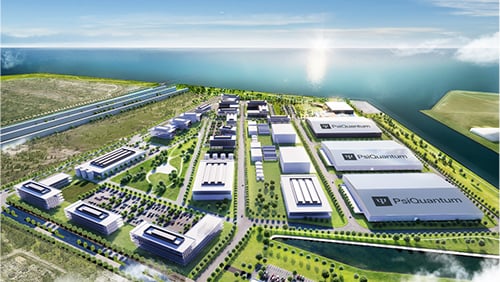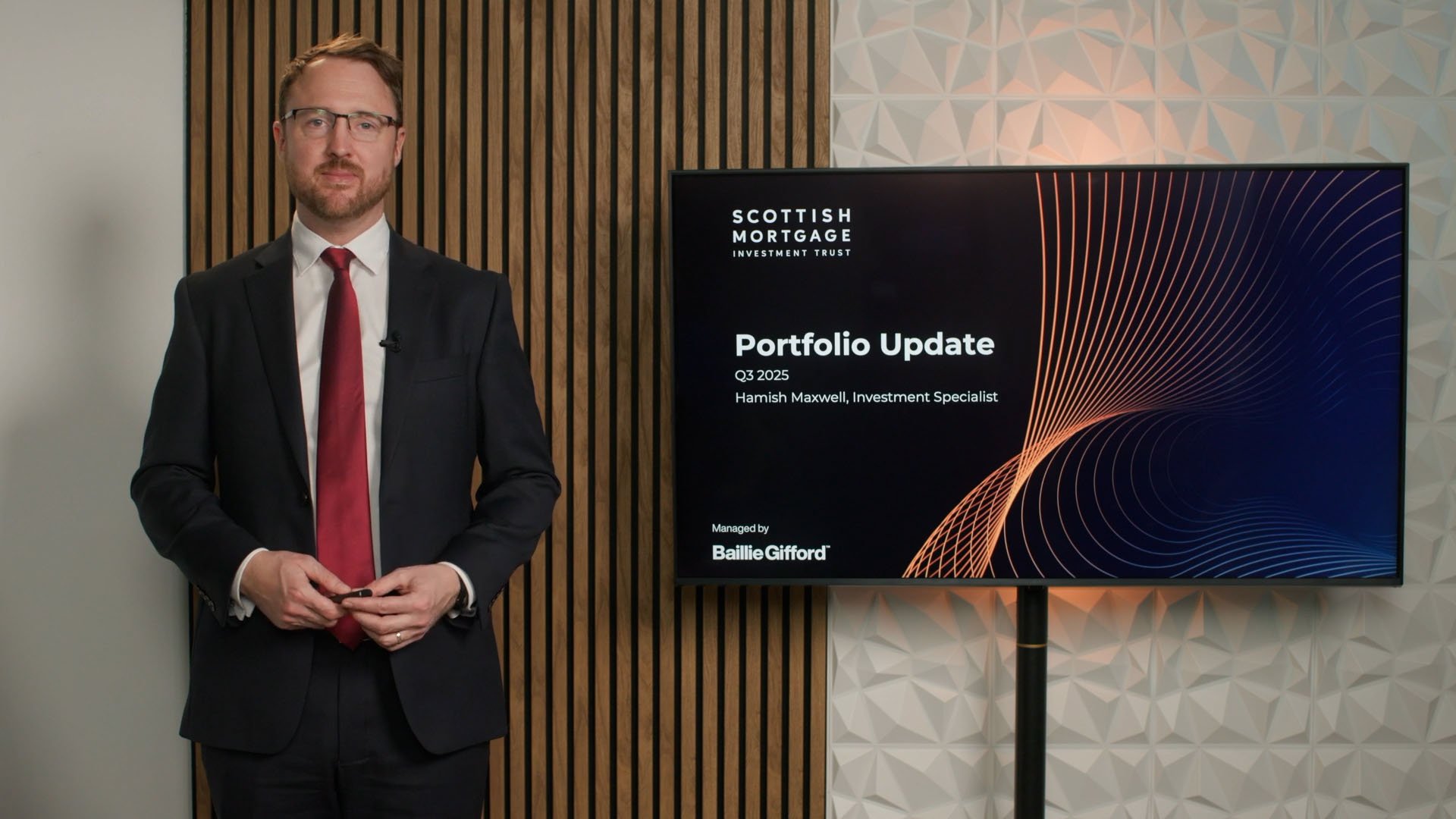UPSIDE Foods: why its vegan founder is championing meat
Claire Shaw – Portfolio Director
Key Points
- Demand for meat is growing, fueling concerns about animal welfare and environmental impacts
- UPSIDE Foods makes meat grown from stem cells, which it grows in a controlled environment
- The firm is seeking regulatory approval to start selling the product for public consumption

This article is a teaser for the Scottish Mortgage UPSIDE Foods podcast. Uma Valeti, UPSIDE Foods’ founder, talks to Lawrence Burns about his plans to put cultivated meat on the public’s plates.
As with any investment, capital is at risk.
Some images stick in your imagination and shape who you become.
Dr Uma Valeti is UPSIDE Foods’ co-founder and chief executive. He recalls an early moment that propelled him towards creating a company that makes meat without the need for animal slaughter.
Aged 12, he attended a neighbour’s birthday party in South India. The front of the house was full of people eating and dancing. At the back, Valeti stumbled upon others killing chickens and goats to feed those at the event.
“There’s intense happiness in the front of the house celebrating a birthday. And there’s a profound amount of sadness and suffering in the back of the house, where it was a death day for the animal,” he told Scottish Mortgage deputy manager Lawrence Burns on the Trust’s Invest in Progress podcast.
The challenge of meat
Meat is central to most of the world’s cultures, traditions and daily meals. But it is becoming ever more unsustainable. Some 70 billion animals are raised yearly to feed humanity, and demand is expected to double by 2050.
“We’ll have to think about finding space for 150 billion animals, the feed to feed them, the greenhouse gas emissions, and the water pollution that comes from having that many lives every year to feed humanity,” explains Valeti.
It’s a dilemma for many consumers. They like the taste of meat but want transparency, humanity, and sustainability in food production, leading to some reducing or eliminating meat from their diet.
Valeti relates. As a medical student, he became a vegan.
“I said, ‘I love this product, but I’m going to stop eating meat.’ And every single day after that, I kept missing the taste of meat. I would say, ‘Oh, I’d love to have this on my table’, but didn’t know how to achieve that.”
Perhaps Valeti would have resigned himself to a restricted diet were it not for an idea he had when working as a cardiologist.
“We were taking stem cells from humans,” he explains. “And we injected them into their hearts when they came in with a heart attack or cardiac arrest. And that’s where this idea came from: could I think about growing meat from animal cells directly?”
Real meat, vegan approved
Valeti makes it clear that his firm makes ‘real’ meat that is genetically identical to what’s on millions of people’s plates. The difference is that UPSIDE cultivates it, ‘growing’ its meat in a laboratory from the highest quality animal cells.
“What we do is we identify the highest quality cells and provide them with the nutrients that the cells need to grow. And we provide that in a very clean, controlled environment,” says Valeti.
“The cells are doubling and doubling and doubling. And ultimately, after two to four weeks, we have enough meat that’s formed because the cells are essentially the building blocks of meat. We shape it into a product that a consumer is used to seeing. It could be a chicken breast, chop, burger, sausage, or steak.”
UPSIDE Foods is not alone in pursuing this idea. But unlike plant-based alternatives to meat, there are significant barriers to producing cultivated meat.
He believes his company is at an advantage, “I think about it as four legs of a stool or a table, the taste, the team, the technology and our track record.”
His claim that UPSIDE’s meat “nails the taste and texture” of meat is corroborated by those who have tried it. And that’s not surprising given the team is drawn from “some of the best in each of the fields, so the biology, the chemistry, manufacturing, and food science and chefs.”
The technology that the team has built is “species agnostic”, meaning that if it works for poultry, it will work for beef and so on.
But that’s not to suggest that it is easy. He refers to the resilience that his team have formed in getting this far, “When people come together with a singular purpose, and they’ve seen that payoff, that builds a level of confidence and that builds a level of resilience.”
It seems to be working. In late 2022, UPSIDE became the first cultivated meat company to receive confirmation from the US Food and Drug Administration that its chicken meat is safe for consumption.
It’s an important early milestone on the path to disrupting a $2tn industry. The next step is to get the US Department of Agriculture’s (USDA) approval.
That will allow UPSIDE’s meat to go on the menus of select high-end restaurants with world-famous chefs. It will be up to them to sell the vision of cultivated meat.

UPSIDE Foods’ co-founder and chief executive Uma Valeti tells Scottish Mortgage’s deputy manager Lawrence Burns how his firm developed a way to create meat without needing farmed livestock.
Listen to the podcast here.
Feeding hearts and minds
Valeti acknowledges that consumers will need to be educated and convinced. But he believes concerns about animal welfare and the environmental impact of farming livestock at scale play to UPSIDE’s favour.
“We have multiple species we are working on,” he says. “We’ve shown that the science works [for chickens]. We’ve shown that we can grow real animal cells into meat that tastes good. And we’ve shown that we can do it in a safe way. The path ahead involves us trying to make this scalable, bring it in a cost that is affordable, and also show people that it is worth investing in it on a large scale.”
“In the next 50 years, if cultivated meat captures about a third of the market, it’ll have a meaningful impact on animal welfare and a huge impact on the opportunity to save human lives.”
Scottish Mortgage’s investment in UPSIDE typifies the Trust’s approach, backing a company that has developed a disruptive innovation beyond the concept stage and now has a chance to grow rapidly by creating transformational change.
If UPSIDE succeeds, the potential for growth and societal benefits are enormous.
About the author - Claire Shaw
Portfolio Director
Claire Shaw is a portfolio director and plays a prominent role in servicing Scottish Mortgage’s UK shareholder base. Before joining in 2019, she spent over a decade as a fund manager with a focus on managing European equity portfolios for a global client base. With a background in analysing companies and communicating investment ideas, Claire is also responsible for creating engaging content that makes the Scottish Mortgage portfolio accessible to all its shareholders. Beyond that, she works closely with the managers, meeting with portfolio companies and conducting in-depth portfolio discussions with shareholders.
Regulatory Information
This content was produced and approved at the time stated and may not have been updated subsequently. It represents views held at the time of production and may not reflect current thinking. Read our Legal and regulatory information for further details.
A Key Information Document is available by visiting our Documents page. Any images used in this content are for illustrative purposes only.
This content does not constitute, and is not subject to the protections afforded to, independent research. Baillie Gifford and its staff may have dealt in the investments concerned. The views expressed are not statements of fact and should not be considered as advice or a recommendation to buy, sell or hold a particular investment.
Baillie Gifford & Co and Baillie Gifford & Co Limited are authorised and regulated by the Financial Conduct Authority (FCA). The investment trusts managed by Baillie Gifford & Co Limited are listed on the London Stock Exchange and are not authorised or regulated by the FCA.
Baillie Gifford Asia (Hong Kong) Limited 柏基亞洲(香港)有限公司 (BGA) holds a Type 1 licence from the Securities and Futures Commission of Hong Kong to market and distribute Baillie Gifford’s range of collective investment schemes and closed-ended funds such as investment trusts to professional investors in Hong Kong.
Baillie Gifford Asia (Singapore) Private Limited (BGAS) is regulated by the Monetary Authority of Singapore as a holder of a capital markets services licence to conduct fund management activities for institutional investors and accredited investors in Singapore. BGA and BGAS are wholly owned subsidiaries of Baillie Gifford Overseas Limited, which is wholly owned by Baillie Gifford & Co.
Europe
Scottish Mortgage Investment Trust PLC (the “Company”) is an alternative investment fund for the purpose of Directive 2011/61/EU (the “AIFM Directive”). Baillie Gifford & Co Limited is the alternative investment fund manager (“AIFM”) of the Company and has been authorised for marketing to Professional Investors in this jurisdiction.
This content is made available by Baillie Gifford Investment Management (Europe) Limited (“BGE”), which has been engaged by the AIFM to carry out promotional activities relating to the Company. BGE is authorised by the Central Bank of Ireland as an AIFM under the AIFM Regulations and as a UCITS management company under the UCITS Regulation. BGE also has regulatory permissions to perform promotional, advisory and Individual Portfolio Management activities. BGE has passported its authorisations under the mechanisms set out in the AIFM Directive.
Belgium
The Company has not been and will not be registered with the Belgian Financial Services and Markets Authority (Autoriteit voor Financiële Diensten en Markten / Autorité des services et marchés financiers) (the FSMA) as a public foreign alternative collective investment scheme under Article 259 of the Belgian Law of 19 April 2014 on alternative collective investment institutions and their managers (the Law of 19 April 2014). The shares in the Company will be marketed in Belgium to professional investors within the meaning the Law of 19 April 2014 only. Any offering material relating to the offering has not been, and will not be, approved by the FSMA pursuant to the Belgian laws and regulations applicable to the public offering of securities. Accordingly, this offering as well as any documents and materials relating to the offering may not be advertised, offered or distributed in any other way, directly or indirectly, to any other person located and/or resident in Belgium other than to professional investors within the meaning the Law of 19 April 2014 and in circumstances which do not constitute an offer to the public pursuant to the Law of 19 April 2014. The shares offered by the Company shall not, whether directly or indirectly, be marketed, offered, sold, transferred or delivered in Belgium to any individual or legal entity other than to professional investors within the meaning the Law of 19 April 2014 or than to investors having a minimum investment of at least EUR 250,000 per investor.
Germany
The Trust has not offered or placed and will not offer or place or sell, directly or indirectly, units/shares to retail investors or semi-professional investors in Germany, i.e. investors which do not qualify as professional investors as defined in sec. 1 (19) no. 32 German Investment Code (Kapitalanlagegesetzbuch – KAGB) and has not distributed and will not distribute or cause to be distributed to such retail or semi-professional investor in Germany, this document or any other offering material relating to the units/shares of the Trust and that such offers, placements, sales and distributions have been and will be made in Germany only to professional investors within the meaning of sec. 1 (19) no. 32 German Investment Code (Kapitalanlagegesetzbuch – KAGB).
Luxembourg
Units/shares/interests of the Trust may only be offered or sold in the Grand Duchy of Luxembourg (Luxembourg) to professional investors within the meaning of Luxembourg act by the act of 12 July 2013 on alternative investment fund managers (the AIFM Act). This document does not constitute an offer, an invitation or a solicitation for any investment or subscription for the units/shares/interests of the Trust by retail investors in Luxembourg. Any person who is in possession of this document is hereby notified that no action has or will be taken that would allow a direct or indirect offering or placement of the units/shares/interests of the Trust to retail investors in Luxembourg.
Switzerland
The Trust has not been approved by the Swiss Financial Market Supervisory Authority (“FINMA”) for offering to non-qualified investors pursuant to Art. 120 para. 1 of the Swiss Federal Act on Collective Investment Schemes of 23 June 2006, as amended (“CISA”). Accordingly, the interests in the Trust may only be offered or advertised, and this document may only be made available, in Switzerland to qualified investors within the meaning of CISA. Investors in the Trust do not benefit from the specific investor protection provided by CISA and the supervision by the FINMA in connection with the approval for offering.
Singapore
This content has not been registered as a prospectus with the Monetary Authority of Singapore. Accordingly, this content and any other content or material in connection with the offer or sale, or invitation for subscription or purchase, of the Trust may not be circulated or distributed, nor may be offered or sold, or be made the subject of an invitation for subscription or purchase, whether directly or indirectly, to persons in Singapore other than (i) to an institutional investor (as defined in Section 4A of the Securities and Futures Act 2001, as modified or amended from time to time (SFA)) pursuant to Section 274 of the SFA, (ii) to a relevant person (as defined in Section 275(2) of the SFA) pursuant to Section 275(1), or any person pursuant to Section 275(1A), and in accordance with the conditions specified in Section 275 of the SFA, or (iii) otherwise pursuant to, and in accordance with the conditions of, any other applicable provision of the SFA.
Where the Trust is subscribed or purchased under Section 275 by a relevant person which is:
(a) a corporation (which is not an accredited investor (as defined in Section 4A of the SFA)) the sole business of which is to hold investments and the entire share capital of which is owned by one or more individuals, each of whom is an accredited investor; or
(b) a trust (where the trustee is not an accredited investor) whose sole purpose is to hold investments and each beneficiary of the trust is an individual who is an accredited investor, securities or securities-based derivatives contracts (each term as defined in Section 2(1) of the SFA) of that corporation or the beneficiaries’ rights and interest (howsoever described) in that trust shall not be transferred within six months after that corporation or that trust has acquired the securities pursuant to an offer made under Section 275 except:
(1) to an institutional investor or to a relevant person or to any person arising from an offer referred to in Section 275(1A) or Section 276(4)(c)(ii) of the SFA,
(2) where no consideration is or will be given for the transfer;
(3) where the transfer is by operation of law; or
(4) pursuant to Section 276(7) of the SFA or Regulation 37A of the Securities and Futures (Offers of Investments) (Securities and Securities-based Derivatives Contracts) Regulations 2018.







